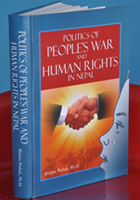 |
|
|
Literature Discussion - Lit-Talk.com
Civil-Military Relations: Theories to Practices
By Dr. Bishnu Pathak and Dr. Surendra Uprety (Nepal)
Dr. Bishnu is Director
Peace and Conflict Studies Center (PCS Center)
P. O. Box 11374, Sukedhara
Kathmandu, Nepal
Click here if you'd like to exchange critiques
Abstract
Since its establishment, the United Nations has become a formidable force toward disarmament, demobilization, reinsertion, repatriation, resettlement, rehabilitation, and (re)integration (DDRRRRR) (Pathak: September 13, 2011:3) or disarmament, demobilization, and (re)integration (DDR) of the armed/military forces and the right sizing of military and armed forces as a whole. Advocating Civil Military Relations (CMR), Huntington developed the objective of civilian control theory, encouraging professionalism of the forces and subjective control for the autonomous run of their institution. Janowitz tried to minimize the difference between objective and subjective controls by defending military effectiveness and democratic civilian control, whereas Haltiner pursued political-military theory on the basis of civil, military, and citizenry elements, reducing conscriptions en mass.
The CMR functions differently in communist regimes such as China and Vietnam. Both adopt Political Commissioner System (PCS) directly appointed by the ruling (single) party. The head of the state/government and party also acts as the supreme commander (non-professional or civilian person) of the military institution.
The CMR that exhibits relationship between civil society, citizenry, and military organization(s) is a new phenomenon in Nepal, although initiated informally from the Dibya Upadesh of Prithvi Narayan Shah. The distance between the armed or military officials and civilians has widened, while the army chief manipulated the institution recruiting his near and dear ones on the pretext of meritocratic recruitment. India has accepted the decade long demand of the Republic Nepal to please the UCPN (Maoist); on the other hand, the China tilted monarchy has been ousted. But the strategic policy of India to put the Maoists under its umbrella, like other political parties of Nepal, could not last long due to the
Click here for the article: Civil-Military Relations: Theories to Practices